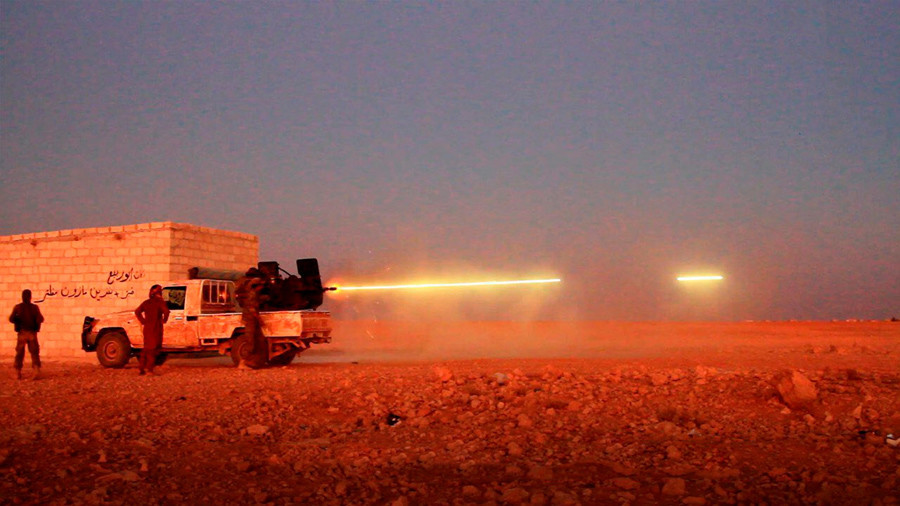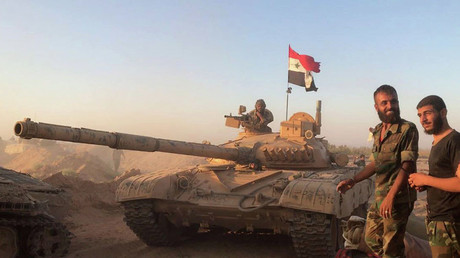US & Saudis boosted ISIS arsenal by sending EU-made advanced arms to Syrian rebels – study

A new investigation revealed much of advanced weaponry used by Islamic State (IS, formerly ISIS/ISIL) fighters came from supplies the US and EU brought to the region. The study of jihadist weaponry claims to be the most comprehensive to date.
The investigation by the London-based Conflict Armament Research (CAR) concludes that the weapons supplied to opposition groups “significantly augmented the quantity and quality of weapons available to IS forces in numbers far beyond those that would have been available to the group through battlefield capture alone.”
More than half of the IS weapons recovered in the study were produced by Russia and China in between 1960 and 1989 – prior to the collapse of the Soviet Union. Former Warsaw Pact states such as Hungary, Romania and Bulgaria – which are now members of the EU – manufactured 30 percent of the weapons and 20 percent of the ammunition recovered by CAR. These countries produced the majority of the weapons documented in Iraq. In Syria, most of the weapons recovered from IS were manufactured by Russia, followed by China and the EU states.
“These findings support widespread assumptions that the group initially captured much of its military materiel from Iraqi and Syrian government forces,” the report says.
“This trend is plausibly the result of transfers made during the Cold War and of surplus transfers immediately after its end,”the report says.
ISIS is known to have been armed largely with Soviet-era weapons. IS militants overran the Iraqi army in Fallujah and other cities following the declaration of the IS caliphate in June, 2014. As Iraqi soldiers fled, jihadists raided arms depots and and bolstered their stockpiles from weapons provided to Iraq during the Iran-Iraq war from 1980-1988.
More advanced weapons were purchased from the European Union by the United States and Saudi Arabia and then supplied to Syrian opposition forces. These groups were then either defeated by or collaborated with IS forces battling to overthrow the Syrian government. The US supply of these weapons to Syrian opposition groups is considered an “unauthorized transfer” and violation of its agreements with the EU.
The entire process, from manufacturing of the weapon in the EU to transfer to IS forces in Iraq, “occurred within two months of the weapon’s dispatch from the factory,” the report adds.
The study was conducted over a three and a half year period and funded by the European Union. Titled “Weapons of the Islamic State,” the report claims to be “unquestionably the most comprehensive, verified study of the group’s weapons to date.”
The report concludes that the US and Saudi Arabia “indirectly allowed IS to obtain substantial quantities of anti-armour ammunition” including anti-tank guided weapons (ATGW) and rockets with tandem warheads. “These systems continue to pose a significant threat to the coalition of troops arrayed against IS forces,” the study adds.
The study adds further evidence to the fueling of the Syrian conflict by the US and its allies. The US supplied weapons to Syrian opposition groups vetted as so-called “moderate rebels” under the banner of the Free Syrian Army (FSA). While the FSA was portrayed in western media as a popular movement defending Syrian citizens, a July 2017 study by the pro-opposition Century Foundation called it a “weapons farm for larger Islamist and jihadist factions, including Syria’s al-Qaeda affiliate.” Saudi Arabia, for its part, has funded jihadist groups Jaysh al-Islam and Ahrar al-Sham.
Iraqi Prime minister Haider al-Abadi declared victory against IS forces on December 10. “Our forces are in complete control of the Iraqi-Syrian border and I therefore announce the end of the war against ISIS,” al-Abadi told a conference in Baghdad. The announcement came six days after the liberation of the IS stronghold of Mosul.
Syrian government forces announced the liberation of the last IS stronghold of Abu Kamal in November. "The liberation of Abu Kamal city is very important because it signals the general fall of the terrorist Daesh organization's project in the region," a statement from the army's general command said.



0 Comments:
Post a Comment
Subscribe to Post Comments [Atom]
<< Home